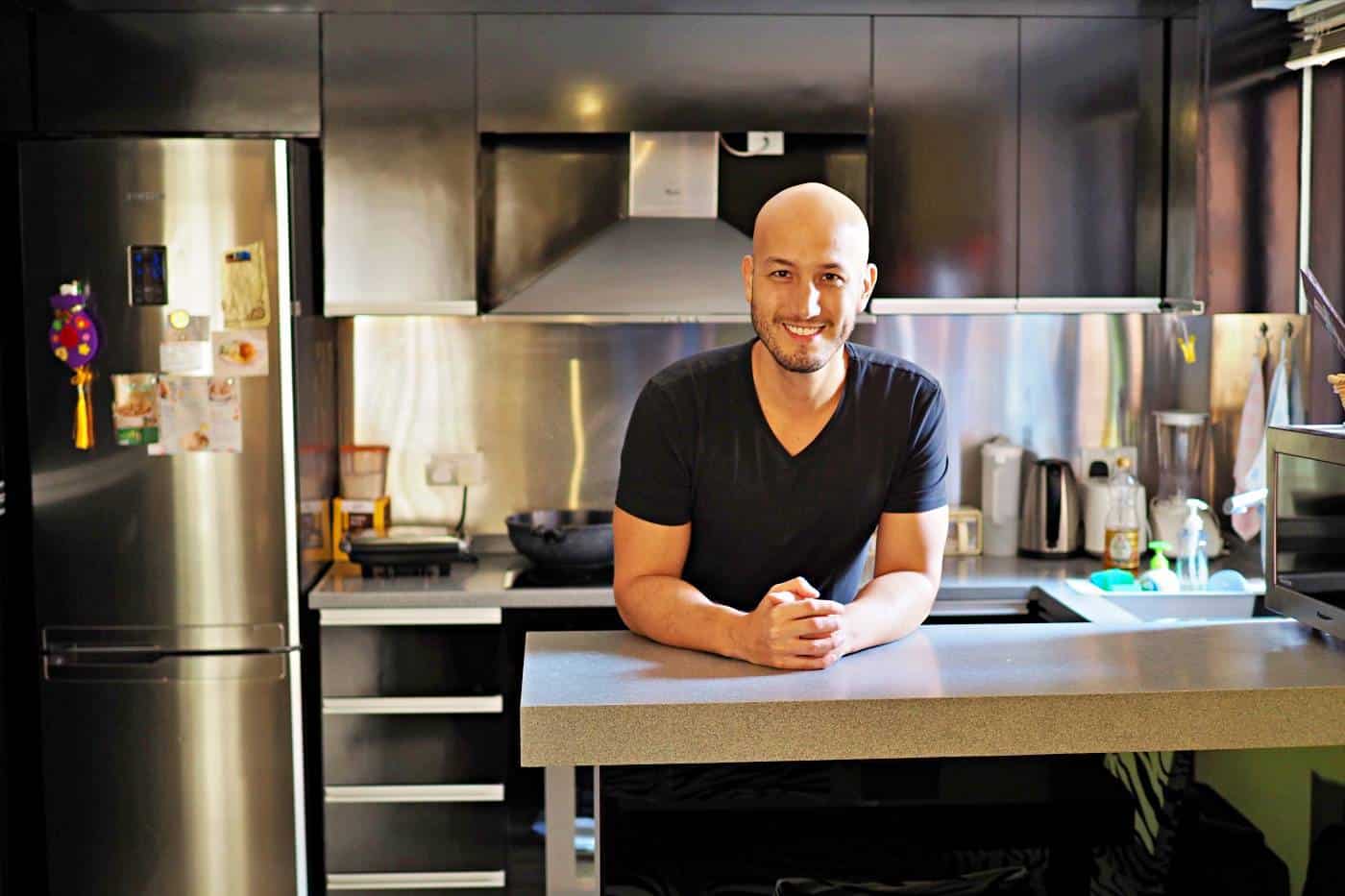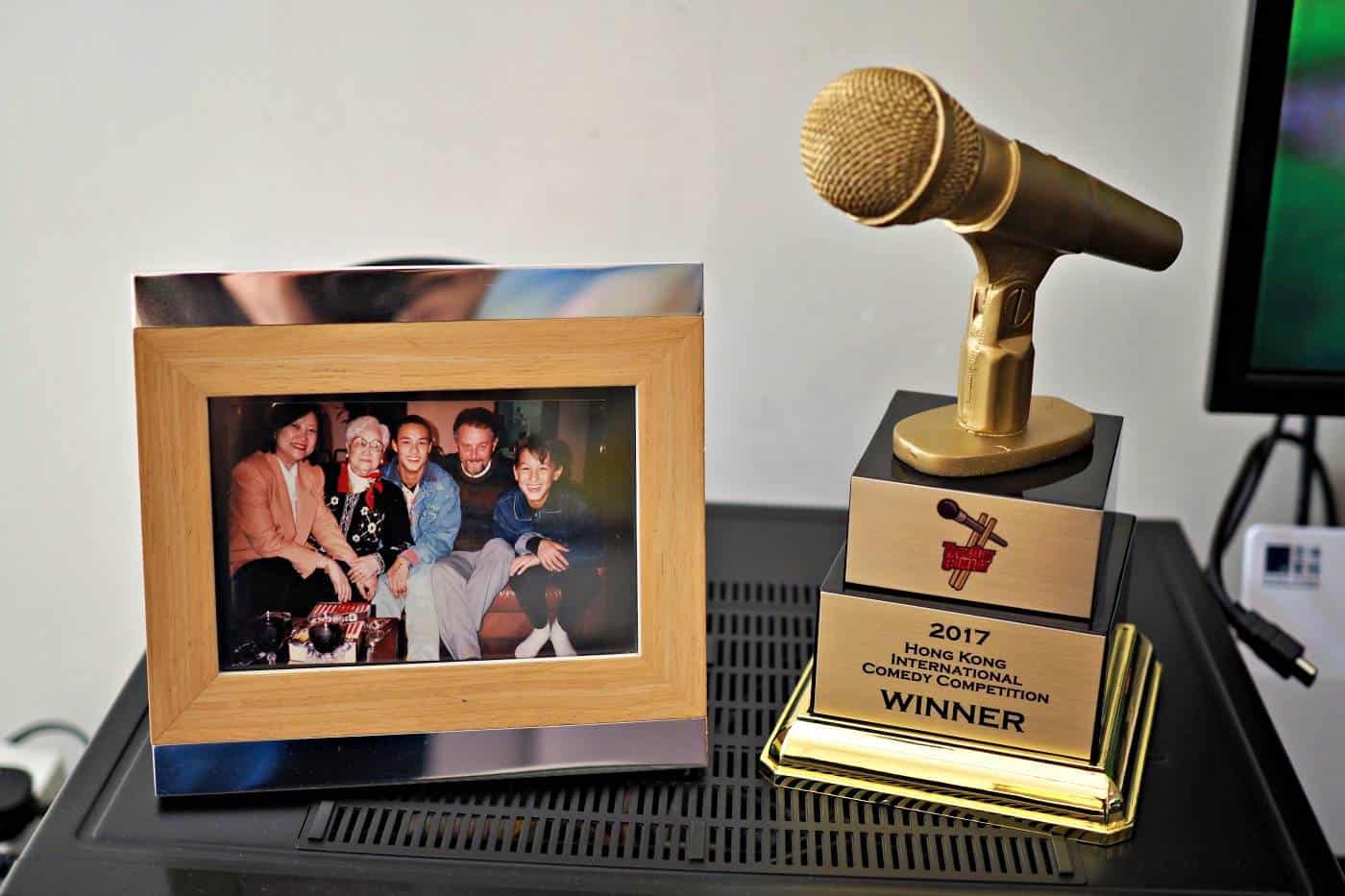
GROWING UP
Food has always been a big part of my family life. I am of mixed Chinese and Australian heritage and was born and raised in Hong Kong. My mum is Shanghainese, and traditional in the sense that she loves to feed the family to the point we explode. For a period of time when I was kid, my grandma also lived with us so that meant even more home cooking. Sunday nights were also set aside to cook at home and eat as a family – absolutely no order-ins, whether Mexican, Chinese, or Western cuisine.
I do not like fine dining. I used to be an investment banker and many bankers loved eating at fancy places. I hated it. I have a massive appetite and the only thing massive at fine dining establishments is the plate serving an olive and a tiny bit of food. I’d always have to get McDonald’s after. I never got the concept.
Ben Quinlan
CORPORATE AND COMEDY
At the beginning of my career, I always saw myself working my way up through a big corporation. There was no pressure from my family to pursue a certain career, but there was always a prestige that came with working at a big global firm that my Chinese mother loved to brag about.
I started my career in Sydney at PwC and then moved to UBS. I always found some of the most intellectual people in the corporate world were management consultants, so I ended up testing out the waters at Oliver Wyman in 2012-13, but it was a gruelling career choice. I flew out every Sunday to a different city, stayed there until Friday, and would “recover” every Saturday. And that routine repeated weekly, giving me almost no time to see my friends. I never enjoyed traveling for work after that. Very soon, I realised that a lot of the shine of working at big firms and climbing up the corporate ladder did not matter to me. I worked so hard that it mentally and physically broke me. I resigned without a job at the end of 2013.
During my seven months sabbatical, I travelled around Asia and started to figure out what to do with my time off. Stand-up comedy was always something I wanted to try. At that point, I felt that my corporate career had completely destroyed my creativity and my confidence also took a huge hit. In 2014, I had my first stand-up gig in at an open mic night. I was given three minutes on stage and it felt like the longest three minutes of my life. But I kept coming back and, soon after, stand-up comedy became a big part of my life and ultimately ended up as a second career.
I knew I couldn’t do stand-up full-time, so I started thinking of other things that I wanted to do with my career. I ended up but in banking but wasn’t content as I was always thinking of better ways of doing things. My then girlfriend said, “You are really good at your job. Why don’t you set up your own consultancy firm?” It sounded crazy, but after some careful planning and working through many iterations of business plans (and service propositions), I launched Quinlan & Associates in 2016.
We specialize in financial services strategic consulting – in a nutshell, providing strategic advice for Boards of financial services companies. I was 32-years old then and I found that the people who made the top decisions were from another generation and the hardest to influence. But my view is this: I may as well just shoot for the stars, go for the biggest, craziest thing you can possibly do. And if I can get even halfway there, I would do amazingly well and be happy that I gave it a shot.
WEARING TWO HATS
Stand-up comedy shows are usually on Friday or Saturday nights. When I go on tour, I typically fly out a few days in advance, meet with current and prospective clients, do some business, and then bring them to my shows.
Don’t underestimate the power of comedy and being able to handle a live audience. The boardroom is a piece of cake compared to being on a comedy stage. Comedy is the purest form of democracy in the whole world – if people don’t like you, you WILL know.
Ben Quinlan
My job as a comedian is to make people laugh. This means getting them on my side – to trust me, like me, and hopefully relate to me. To do this well, you need to constantly read the room and pay attention to the audience’s reactions. You have to train your EQ to pick up cues as quickly as possible and to change course when necessary to earn the audience’s respect.
I found that comedy really enriched my business because it applies much of the same logic as in the boardroom. If I can make this person laugh and make them trust what we do, it becomes a critical foundation on which to build good business relationships. I have never hidden the fact that I wear two hats, and I am very fortunate I can do both jobs side by side.
Keynotes for aspiring comedians:
- Observation & Perspective
Good comedy is all about perspective. It’s not like I hang out with clowns every day or that my life is funnier than anyone else. We all see the same things, but humour really comes through being able to see something from a different perspective, and to see daily life events from angles that other people may be aware of but haven’t given a great deal of thought to.
- Delivery
While your material is important, 90% of the job is about delivery. You can have 20 people saying the same joke, but all will get a very different audience response. It’s all about your stage presence, your likeability, and your timing – where you pause, where your facial expressions change, inflexions in your voice, etc. The most subtle change in delivery can make or break a good joke.
- Speak to a Smart Audience
It’s important to try and make the audience feel smart. Part of this may involve setting up stories and jokes to have a point, not just a punchline. When you see the audience go, “Ah! I get it!”, that’s when you know you have a clever joke that pushes them uncover the humour, not just simply be fed it.
- Pay Attention and Be Flexible
It’s important to remain agile on stage and adapt your jokes (and delivery) based on the audience’s reaction. The same logic applies in the boardroom. You need to be on your toes, tell your clients what they want to hear, but also be able to stand your ground when they hear something that might not be so pleasant or relatable. Remaining flexible and spontaneous is an invaluable long-term skill both on and off the stage.
IN THE KITCHEN



RECIPE FOR SUCCESS
Do what you love and what you are good at, and it’s more than likely that you’ll be able to make money from it along the way.
I call that the Holy Trinity in a career. Start with what you are passionate about. Most people I see invest huge amounts of their time, energy, and heart into things that they love, which tends to make them great at it. Once you’re the master of your craft, whatever that craft may be, you will be able to charge money for it.
When you combine what you love with what you are good at, you are likely to become a master of your chosen craft (regardless of what that craft is), which you can charge money for.
Ben Quinlan
Every Quinlan man runs their own business. My father loves music and that is what he’s done his whole life – produced music, written music, and made money from music. My brother was a world-class swimmer and runs a swimming coaching business in Hong Kong.
I love the intellectual side of my business and being the person that people come to for advice. To me, that is the most mentally rewarding part of my career.
Our family motto is, “Nothing succeeds as planned.” Be flexible, as you’ll never know when things come up, and don’t stress too much. So many people tend to think in the past (which tends to drive emotions of regret) and in the future (which tends to encourage anxiety due to a “what if?” mindset). Both mindsets are relatively useless in excess and can even be quite toxic. The fact is, if you enjoy what you are right doing now, you’re on the right track. Just take things one step at a time and enjoy the ride.
This interview has been edited for length and clarity. Interview and photography by Theresa Burhan. Edited by Lim Ai Leen.










